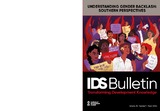Understanding Gender Backlash: Southern Perspectives
| dc.contributor.author | Edstrom, Jerker | |
| dc.contributor.author | Edwards, Jenny | |
| dc.contributor.author | Lewin, Tessa | |
| dc.contributor.author | McGee, Rosemary | |
| dc.contributor.author | Nazneen, Sohela | |
| dc.contributor.author | Skinner, Chloe | |
| dc.coverage.spatial | Bangladesh | en |
| dc.coverage.spatial | Brazil | en |
| dc.coverage.spatial | India | en |
| dc.coverage.spatial | Kenya | en |
| dc.coverage.spatial | Lebanon | en |
| dc.coverage.spatial | Uganda | en |
| dc.date.accessioned | 2024-03-04T12:55:59Z | |
| dc.date.available | 2024-03-04T12:55:59Z | |
| dc.date.issued | 2024-02-26 | |
| dc.identifier.citation | Edström, J. et al. (2024) 'Understanding Gender Backlash: Southern Perspectives', IDS Bulletin 55.1, DOI: 10.19088/1968-2024.100 | en |
| dc.identifier.issn | 1759-5436 | |
| dc.identifier.uri | https://opendocs.ids.ac.uk/opendocs/handle/20.500.12413/18257 | |
| dc.description.abstract | Far from seeing continued steady progress on gender equality, we are currently witnessing significant backlash against gender and sexual rights. Limited and hard-fought gains for some are being reversed, co-opted, and dismantled – all amplified through new social media and digital technologies. This issue of the IDS Bulletin addresses the urgent question of how we can better understand the recent swell of anti-gender backlash. Perspectives from Bangladesh, Brazil, India, Kenya, Lebanon, Uganda, and the UK detail examples of anti-gender backlash in different contexts, and the actors, interests, and tactics involved. The articles here present critical perspectives for framing and interpreting a global phenomenon not yet well understood. The IDS Bulletin starts by grouping the issues discussed into three themes: voice and tactics; framings and direction; and temporality and structure. The authors explore the features of the recent and current wave of backlash that include increased authoritarianism, religious resurgence, populist hyper-nationalism, and the concurrence of misogyny, racism, homophobia, and transphobia. Along the way the articles also point to connections with parallel debates in development, contributing to nudging this topic out of the ‘gender and development corner’. The set of complementary viewpoints on the framing and theorising of backlash presented in this issue is also intended to contribute to scholarship by attending to an increasingly recognised gap in research. By presenting new ways of analysing and countering backlash from more diverse settings, this issue of the IDS Bulletin calls for the development of better strategies and tactics for resistance and reclaiming gender justice. | en |
| dc.description.sponsorship | Swedish International Development Cooperation Agency (Sida) | en |
| dc.language.iso | en | en |
| dc.publisher | Institute of Development Studies | en |
| dc.relation.ispartofseries | IDS Bulletin;55.1 | |
| dc.rights | This is an Open Access article distributed under the terms of the Creative Commons Attribution 4.0 International licence (CC BY), which permits unrestricted use, distribution, and reproduction in any medium, provided the original authors and source are credited and any modifications or adaptations are indicated. | en |
| dc.rights.uri | http://creativecommons.org/licenses/by/4.0/ | en |
| dc.subject | Gender | en |
| dc.subject | Politics and Power | en |
| dc.title | Understanding Gender Backlash: Southern Perspectives | en |
| dc.type | Article | en |
| dc.rights.holder | Institute of Development Studies | en |
| dc.identifier.team | Power and Popular Politics | en |
| dc.identifier.doi | 10.19088/1968-2024.100 | |
| dcterms.dateAccepted | 2024-02-26 | |
| rioxxterms.funder | Default funder | en |
| rioxxterms.identifier.project | Default project | en |
| rioxxterms.version | VoR | en |
| rioxxterms.versionofrecord | 10.19088/1968-2024.100 | en |
| rioxxterms.funder.project | e4b8632d-62dd-4f31-9936-43860ac26f9a | en |
Files in this item
This item appears in the following Collection(s)
Except where otherwise noted, this item's license is described as This is an Open Access article distributed under the terms of the Creative Commons Attribution 4.0 International licence (CC BY), which permits unrestricted use, distribution, and reproduction in any medium, provided the original authors and source are credited and any modifications or adaptations are indicated.


